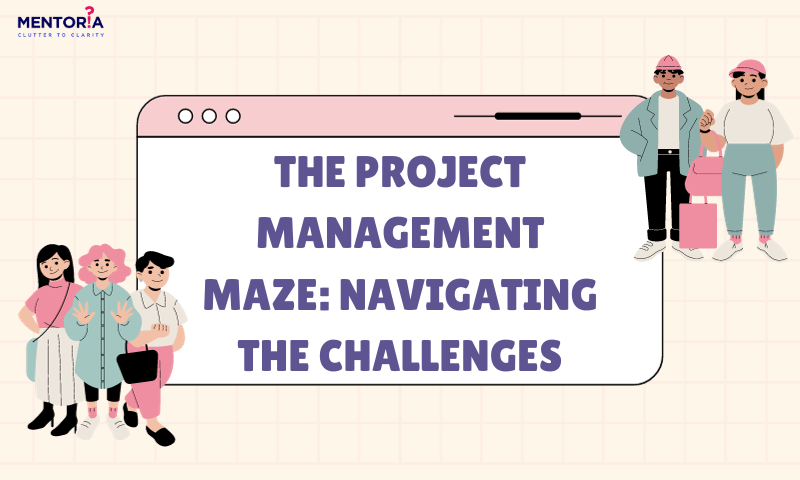The Project Management Maze: Navigating The Challenges

Jump to Section
Are you ready to embark on a thrilling adventure into the world of project management? Buckle up, because we’re about to dive deep into the challenges that lie ahead and equip you with the skills to conquer them. From juggling deadlines and resources to managing stakeholders and mitigating risks, project management is a complex endeavour. In this blog, we’ll explore the seven significant challenges that project managers face and why they are crucial for success. So, grab your hard hat, put on your problem-solving goggles, and let’s get started!
The Maze Of Deadlines: The Importance Of Time Management
Imagine walking through a maze where time is of the essence. Projects have strict deadlines, and meeting them requires effective time management skills. According to recent statistics, 43% of projects face delays, leading to increased costs and customer dissatisfaction. We’ll provide you with practical tips and techniques to master time management and keep your projects on track.
- Prioritise tasks: Break down your project into smaller, manageable tasks and prioritise them based on their importance and deadlines. Focus on high-priority tasks first to ensure timely completion.
- Set realistic deadlines: Be mindful of setting realistic deadlines that consider the complexity of the project and the availability of resources. Avoid overcommitting and create a buffer for unexpected delays.
- Utilise project management software: Leverage the power of project management tools to schedule tasks, set deadlines, and track progress. These tools can help you stay organised and ensure you meet your project milestones on time.
- Communicate deadlines clearly: Clearly communicate project deadlines to your team and stakeholders. Ensure everyone is aware of the time constraints and the importance of meeting deadlines. Regularly update and communicate any changes to keep everyone informed.
Resource Roulette: Balancing Limited Resources
Every project manager knows the challenge of allocating limited resources efficiently. In a recent study, 61% of project managers reported that resource management was their top concern. We’ll explore how to optimise resource allocation, collaborate with teams, and overcome common resource-related hurdles, ensuring your projects sail smoothly.
- Identify resource requirements: Begin by identifying the specific resources needed for your project, including human resources, equipment, and budget. Conduct a thorough analysis to determine the optimal allocation of resources.
- Utilise resource management tools: Implement resource management tools to track and allocate resources effectively. These tools can provide real-time insights into resource availability, utilisation, and potential bottlenecks.
- Foster cross-team collaboration: Encourage open communication and collaboration between teams to ensure efficient resource allocation. Facilitate knowledge sharing and resource sharing to optimise resource utilisation across projects.
- Monitor and adjust resource allocation: Regularly monitor resource utilisation and adjust allocations as needed. Keep a close eye on resource conflicts and potential shortages, and proactively address them to avoid disruptions to project timelines.
Stakeholder Tango: The Art Of Managing Diverse Interests
Projects involve various stakeholders with different expectations, interests, and perspectives. Navigating this complex dance can be overwhelming. Did you know that ineffective communication is a leading cause of project failure? We’ll delve into the importance of stakeholder management, effective communication strategies, and how to align diverse interests for project success.
-
- Identify key stakeholders: Begin by identifying all relevant stakeholders for your project, including clients, team members, sponsors, and end-users. Determine their interests, expectations, and influence on the project.
- Establish clear communication channels: Set up effective communication channels to ensure smooth and transparent communication with stakeholders. Regularly update them on project progress, address concerns promptly, and seek their input and feedback.
- Engage stakeholders early: Involve stakeholders in the project planning and decision-making processes from the beginning. This fosters a sense of ownership and ensures their interests are considered throughout the project lifecycle.
- Manage conflicts proactively: Anticipate potential conflicts among stakeholders and address them proactively. Act as a mediator, find common ground, and strive for win-win solutions to maintain positive stakeholder relationships.
Risky Rollercoaster: Mitigating Project Risks
Projects are filled with uncertainties, risks, and unexpected twists. A staggering 57% of organisations experienced a project failure due to risks that were not adequately managed. We’ll equip you with the techniques to identify, analyse, and mitigate risks, ensuring your projects stay on a steady course.
- Identify and assess risks: Conduct a thorough risk assessment to identify potential risks and their impact on project objectives. Categorise risks based on their severity and likelihood of occurrence.
- Develop a risk response plan: Create a comprehensive risk response plan that outlines specific strategies for mitigating, accepting, transferring, or avoiding each identified risk. Assign responsibilities and timelines for executing the plan.
- Monitor and review risks: Regularly monitor the project environment for new risks and evaluate the effectiveness of the risk response plan. Update the plan as needed to address emerging risks and ensure it remains relevant.
- Foster a risk-aware culture: Encourage a culture of risk awareness and proactive risk management within your project team. Encourage team members to report potential risks, reward risk mitigation efforts, and learn from past project experiences.
Team Turbulence: Leading And Motivating Your Team
Managing a diverse team with different skills, personalities, and work styles can be like herding cats. Did you know that 75% of employers rate teamwork and collaboration as “very important”? We’ll explore effective leadership strategies, motivation techniques, and team-building exercises to foster a productive and cohesive project team.
- Establish clear goals and expectations: Set clear project goals, define roles and responsibilities, and communicate performance expectations to your team. This provides a sense of direction and clarity, enhancing team productivity.
- Foster open communication: Create an environment that encourages open and honest communication among team members. Establish regular check-ins, team meetings, and feedback sessions to ensure effective information sharing and collaboration.
- Recognise and motivate team members: Acknowledge and appreciate the efforts and achievements of your team members. Provide regular feedback, rewards, and recognition to boost morale and motivation.
- Foster a positive team culture: Cultivate a positive and inclusive team culture that values diversity, encourages collaboration, and supports individual growth. Encourage teamwork, cooperation, and mutual respect among team members.
Scope Creep: Controlling Project Scope
Scope creep, the gradual expansion of project requirements beyond the original scope, is a common challenge that can wreak havoc on timelines, budgets, and project success. Studies show that 52% of projects experience scope creep. We’ll discuss strategies to define and control project scope, effectively managing changes and preventing scope creep from derailing your projects.
- Define clear project objectives: Start by clearly defining the project objectives, deliverables, and scope with stakeholders. Ensure that everyone involved has a shared understanding of what is included in the project scope and what is not.
- Conduct thorough requirements gathering: Invest time and effort in gathering and documenting project requirements comprehensively. Engage stakeholders early on to identify and prioritise their needs and expectations.
- Implement change management processes: Establish a change management process that includes a formalised procedure for requesting and approving changes to the project scope. This helps minimise uncontrolled scope creep and ensures that any changes align with project goals and objectives.
- Regularly review and reassess the project scope: Conduct periodic reviews of the project scope to assess its alignment with project objectives and to identify and address any potential scope creep. Engage stakeholders in these reviews to maintain transparency and gather valuable insights.
Technological Twists: Harnessing The Power Of Project Management Tools
In our digital age, project management tools and software are essential for successful project execution. Yet, selecting the right tools and utilising them effectively can be daunting. We’ll guide you through the landscape of project management software, highlighting key features and best practices to streamline your workflows and increase productivity.
- Research and select the right tools: Conduct thorough research to identify project management tools that align with your specific project needs. Consider factors such as features, usability, scalability, and integration capabilities before making a decision.
- Provide training and support: Once you have selected the appropriate project management tools, ensure that your team members receive proper training and support to effectively utilise the tools. This empowers them to leverage the features and functionalities to their fullest potential.
- Customise tools to fit your workflow: Tailor the project management tools to fit your team’s unique workflow and processes. Configure the tools to align with your project management methodologies, terminology, and reporting requirements.
- Regularly evaluate and update tools: Keep a pulse on the evolving landscape of project management tools and technologies. Regularly evaluate the effectiveness of your current tools and consider upgrading or integrating new tools to improve efficiency and collaboration within your team.
Project Management With Mentoria!
You’ve navigated the challenging landscape of project management and emerged victorious. By addressing the seven significant challenges head-on, you’re now equipped with the knowledge and strategies to lead successful projects. Remember, project management is a continuous learning journey, and embracing the challenges is crucial for personal and professional growth. As the demand for skilled project managers grows exponentially, your expertise in navigating these challenges will set you apart and open doors to exciting career opportunities. So, keep honing your skills, stay adaptable, and remember that with the right mindset and tools, you can conquer any project management obstacle that comes your way!
We’re here to provide you with all the help! Kick-start your journey with Mentoria and discover the right fit for you. Feel free to call us to speak to our career mentors and choose the right guidance plan that suits your needs.
Mentoria’s career guidance programme enables you to choose your perfect fit from 3 streams, 850+ courses, and 12,000+ careers, and discover what will bring out the best in you.









